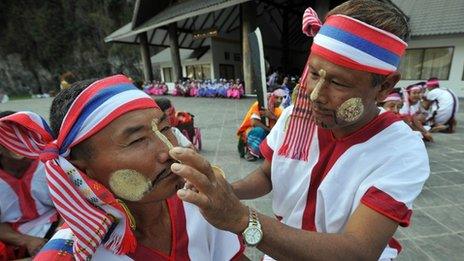Who are Burma's Karen rebels?
- Published

A welcoming ceremony was staged by Karen men as peace talks began
The Karen National Union (KNU) has been fighting the central government since the very early days of Burma's independence from Britain six decades ago.
Largely Christian and favoured by the British during the years of colonial rule, the Karen rebelled against what they saw as repressive treatment by the Burmese nationalist military.
They later accused the army of genocide in its frequent sweeps against their villages in the impoverished and inaccessible hill country along the Thai border.
The Karen have been one of the strongest of the many ethnic groups battling for self-rule in Burma. At one time they boasted an army of 14,000 men and controlled much territory along the border.
But they steadily lost ground and have in recent years been reduced to relatively small-scale guerrilla attacks on army troops.
Large numbers of Karen villagers have fled their homes, in one of the world's least reported refugee crises, and about 100,000 still live in rudimentary camps on the Thai side of the border.
The Karen appear to have achieved little during their six decades of fighting - but some now see a chance of peaceful coexistence.
The Burmese government is under pressure from the United States and its allies to end the fighting along its borders, and that appears to give the Karen and other ethnic groups the best chance of lasting peace.
'List of demands'
KNU leaders warn, however, that there is still a long way to go.
One was quoted as saying that the Karen must not sacrifice their goal of self-rule and surrender to government pressure.
The KNU has released a list of demands to be satisfied before a formal peace agreement can be reached with the national government.
They want security guarantees, an end to the forced labour of civilians, a release of prisoners and an effective mechanism to monitor the truce. They also want the provision of basic services to their underdeveloped region and land reform.
The Karen are the last of Burma's ethnic rebels to agree a ceasefire with the authorities. But fighting continues to flare further north, along the Chinese border, between the army and ethnic Kachin rebels.
Their truce broke down in June and the fighting has continued despite an order by President Thein Sein to the army to end offensive operations.
The renewed conflict in Kachin state will help keep expectations in check. But the Karen have now taken the first tentative step towards peace after 63 years of conflict.
- Published12 December 2011
- Published18 November 2011
- Published30 November 2011